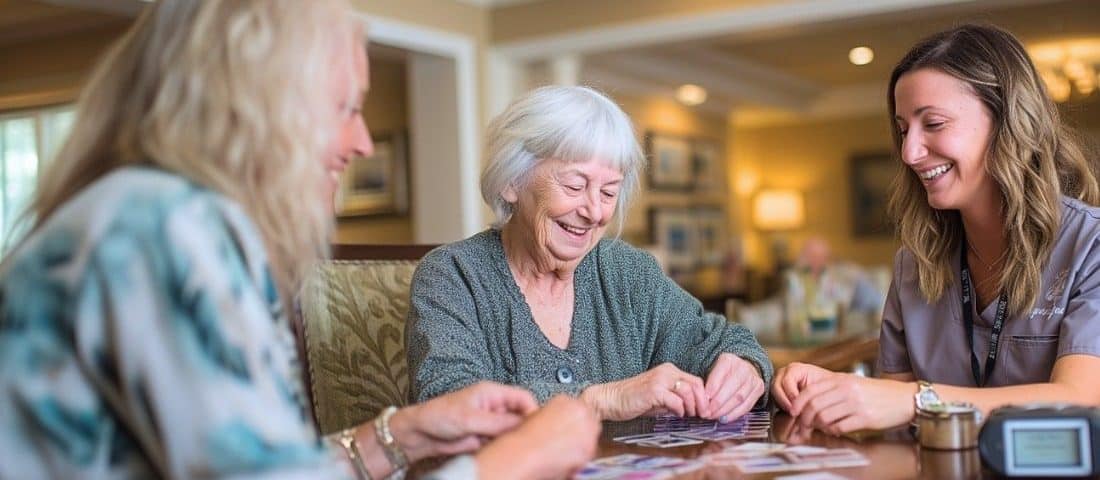
Alzheimer’s disease is a progressive brain disorder that impacts memory, thinking, and daily function. The condition affects not only those with the condition but also their families. Still, a diagnosis does not end the chance for a meaningful life. While there is no cure, practical strategies can preserve dignity, encourage connection, and support well-being for seniors with Alzheimer’s. Focusing on quality of life rather than decline helps create moments of clarity, comfort, and joy.
Tips for Enhancing Everyday Life for Seniors With Alzheimer’s
Person-Centered Care Philosophy
At the heart of improving quality of life is the philosophy of person-centered care. This approach recognizes that each person with Alzheimer’s is unique with their own life story, values, and personality. Rather than focusing only on deficits, person-centered care builds on remaining abilities. It respects autonomy as much as possible and always aims to preserve dignity. The goal is to adapt the environment and interactions to the person, not the other way around.
Improving Communication and Connection
Effective communication is crucial when caring for seniors with Alzheimer’s disease. However, it isn’t always easy to talk to someone with dementia. As verbal abilities decline, understanding and connection rely more on patience and intention.
- Verbal and Non-Verbal Cues: Pay close attention to the words and the tone used to express them. Body language, facial expressions, and gestures often reveal more than words alone.
- Simplifying Language: Use short, simple sentences and avoid complex instructions or multiple questions at once. Speak slowly and clearly.
- Active Listening: Even if their words seem illogical, acknowledge and validate their emotions. Saying something like, “I understand you’re feeling frustrated right now,” can build trust and ease anxiety.
- Dealing with Difficult Conversations: Patience is key. Respond calmly and reassuringly to repetitive questions. For difficult conversations, focus on their feelings, create distractions, or gently redirect the topic to a more suitable one.
Creating a Safe and Supportive Environment
A calm, well-structured space helps reduce anxiety and supports greater independence. Simple safety modifications, such as grab bars, secured rugs, and motion-sensor lighting, can help prevent falls. Labeling rooms and drawers, locking away hazardous items, and simplifying furniture layouts add clarity and reduce confusion. Consistent routines for waking, meals, activities, and rest provide a reassuring sense of stability and organization.
Cognitive Stimulation and Engagement
Keeping the mind active, even in small ways, can support cognitive health and help reduce agitation. Memory aids such as photo albums, journals, or calendars can cue familiar memories and a sense of time. Engaging in enjoyable activities can also make a meaningful difference. Other good activities include simple puzzles, sorting games, coloring, crafts, music therapy, and more. Sensory stimulation activities can also be beneficial for seniors with Alzheimer’s disease.
Supporting Nutrition and Hydration
Maintaining good health is essential for both physical and cognitive function. As Alzheimer’s disease progresses, individuals may face challenges such as swallowing difficulties, reduced appetite, or confusion. Offering soft foods, smaller, more frequent meals, and assistance with eating can help alleviate these issues. Dehydration can worsen confusion, so it’s essential to provide water, juice, or other fluids regularly throughout the day. Creating a pleasant mealtime by reducing distractions, using familiar dishes, and sharing the table can also add comfort.
Maintaining Social Engagement
Isolation can speed up cognitive and emotional decline. Staying socially connected is crucial for seniors with Alzheimer’s disease. Regular, short visits with family and friends offer comfort without feeling overwhelmed. Gentle conversation and familiar activities help maintain bonds. Community programs and adult day care centers also provide social interaction and mental stimulation.
Taking the Next Step: Support Beyond Home
Enhancing the quality of life for seniors with Alzheimer’s requires intention, compassion, and thoughtful daily practices. Yet, even with the best at-home strategies, caregiving can become overwhelming.
At Bethel Gardens, memory care is more than a service; it’s a commitment to the health and well-being of seniors. Our trained staff creates a safe environment and delivers person-centered care that brings comfort, structure, and joy to residents. Contact us today to learn how we can provide the care and support your loved one deserves.



